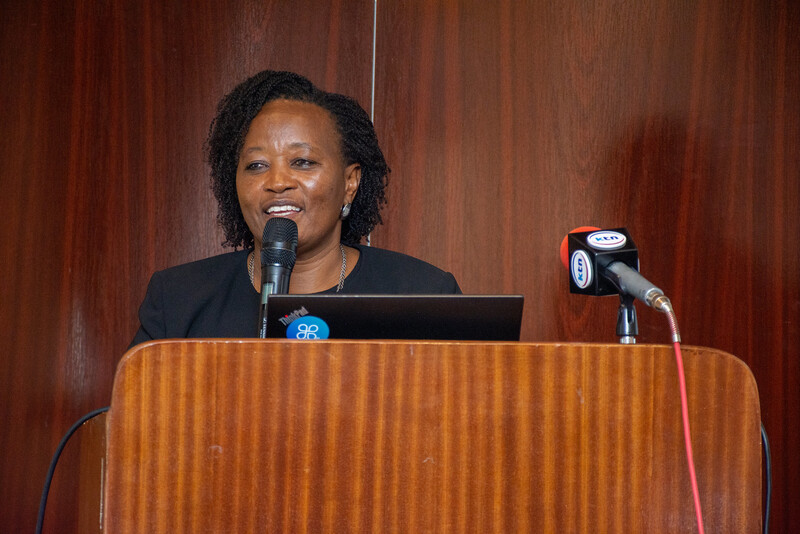How misconceptions are undermining breastfeeding efforts in Kenya

Experts have called for increased education and awareness about the many benefits of breastfeeding - not only for the child and mother but also for the economy. They emphasise that promoting breastfeeding improves health outcomes, reduces medical costs, and contributes to national development.
"My breasts will sag." "I’ll smell like milk all the time." "My baby will become too clingy."
These are just a few of the worries many Kenyan women carry silently as they approach motherhood. Add to that the fears of public shame, cultural stigma, and the overwhelming myths shared by family and and it’s no surprise that more and more women are avoiding breastfeeding altogether.
More To Read
- How Riruta’s upgrade to Level IV hospital is transforming healthcare across Dagoreti
- Ruto targets faster healthcare access with KEMSA direct medicine deliveries to hospitals
- Ministry of Health announces measures to reduce maternal, newborn deaths
- Health Ministry rolls out new oxygen equipment to hospitals
- From free to unaffordable: Why more Kenyan women are giving birth at home again
- Counties undermining UHC by redirecting reimbursements, Health Committee says
The result? A quiet but alarming shift that threatens the future of Kenya’s children.
In a country where more than 90 per cent of births occur in hospitals, exclusive breastfeeding - despite clear medical endorsement - has stalled at around 60 per cent for nearly a decade.
Early initiation within the first hour of birth remains low. Bottle feeding and formula use are increasing. And slowly, silently, breastfeeding - one of the most powerful tools we have to protect children - is being eroded.
This decline isn’t just about personal choice or convenience. It is being driven by deep-rooted myths, misinformation, and a troubling lack of structured, consistent support for mothers. Many women, especially first-time mothers, face overwhelming pressure to supplement with formula or abandon breastfeeding early, often based on misconceptions like “breast milk is not enough” or “babies who drink formula sleep better.”
Speaking during a media consortium ahead of World Breastfeeding Week, nutritionist Mary Kimani addressed and debunked several widespread myths that continue to discourage mothers from breastfeeding.
She pointed out that misconceptions such as "pregnant women cannot breastfeed," "mothers who deliver via C-section are unable to breastfeed," "sick mothers should not breastfeed," and "breast milk must be discarded if a mother has been away for long" are all unfounded and misleading.
“We’ve seen a worrying trend where people are beginning to equate baby formula with breast milk, which is simply not true,” Kimani said.
She emphasised that breast sagging is a natural part of ageing and happens whether or not a woman breastfeeds. She also clarified that breast milk does not 'go sour' inside the breast, making it a reliable and safe source of nourishment for infants at all times.
 Nutritionist Mary Kimani. (Photo: Charity Kilei)
Nutritionist Mary Kimani. (Photo: Charity Kilei)
Kimani also warned against the common belief that feeding babies heavy foods like porridge helps them sleep better. “Introducing such foods too early can be harmful because babies’ digestive systems are not yet ready for them,” she said.
She stressed that many women do not breastfeed exclusively for the first six months or continue up to two years as recommended, missing out on the full benefits of breastfeeding. “Breast milk is white gold,” she declared, “It acts as a baby’s first immunisation, boosts IQ, prevents disease, is cost-effective, and even contributes to economic growth.”
Kimani called for stronger public education to counter misinformation and help mothers make informed decisions that prioritise the health of both their children and themselves.
Prof Grace Irimu, a pediatric nephrologist, noted that Breastfeeding is one of the most effective, low-cost interventions for child survival, noting that exclusive breastfeeding can prevent up to 13 per cent of all deaths in children under five.
It can reduce the risk of diarrhoea and pneumonia - two of the leading causes of child mortality in Kenya - by up to 50 per cent and significantly cut hospital admissions. Beyond physical health, breast milk improves cognitive development.
Some believe breastfeeding should stop once a child begins eating solids. Others think a baby refusing the breast signals a curse. Some fear that breastfeeding in public will invite judgment, or that it ties women down and limits their freedom.
She notes that these beliefs are harming national progress. “Kenya now has the lowest annual reduction in neonatal deaths among East African countries,” she said. “We are trying to solve problems with foreign models, while ignoring what is right in front of us.”
She emphasises that appropriate breastfeeding - starting within the first hour, continuing exclusively for six months, and maintaining for up to two years and beyond —could be one of the “magic bullets” in reducing child mortality.
Irimu highlighted that over 500,000 children in Kenya do not benefit from breastfeeding, a gap that significantly contributes to child mortality. She emphasised that breastfeeding could prevent nearly one million child deaths in Kenya, dramatically reduce hospital visits and admissions, and support the country's drive toward the “one cot, one baby” policy, aimed at improving neonatal health outcomes.
“Breastfeeding reduces the risk of postpartum haemorrhage, which is one of the leading causes of maternal deaths,” Professor Irimu stated. She also noted that many newborns miss out on breastfeeding within the first hour of life—a critical window for survival—due to routine separation of mothers and babies in health facilities, which delays essential care and bonding.
Currently, only 61 per cent of Kenyan infants are exclusively breastfed, well below the global target of 70 per cent. Professor Irimu called for urgent investment in health system strengthening, public education, and culturally sensitive support to ensure every child can benefit from the life-saving and life-enhancing power of breastfeeding.
Dr Sultan Matendechero, Senior Deputy Director at the Ministry of Health, highlighted breastfeeding as an innovative and practical pathway toward achieving Universal Health Coverage (UHC) in Kenya.
“It is impossible to realise UHC without a strong foundation in primary health care,” he said. “And primary health care is fundamentally about making care accessible, affordable, and community-centred.”
He emphasised that disease prevention and health promotion must form the backbone of Kenya’s health strategy. “We must shift our focus from costly curative approaches to proactive, preventive interventions that work,” he noted. “Breastfeeding is one of those interventions—it promotes lifelong health and reduces the need for expensive medical care.”
 Dr Sultan Matendechero. (Photo: Charity Kilei)
Dr Sultan Matendechero. (Photo: Charity Kilei)
Dr Matendechero cited evidence showing that for every one shilling invested in disease prevention, the country can save up to nine shillings in treatment costs. This, he said, is a critical insight as the government grapples with a KSh 300 billion health financing gap. While the health sector requires KSh 500 billion annually, county governments currently receive only KSh 250 billion from consolidated funds—leaving a significant shortfall.
“Focusing on prevention and health promotion is not optional—it’s the only way to sustainably bridge that gap,” he said. Breastfeeding, in particular, remains one of the most cost-effective strategies, with the potential to lower child mortality, reduce hospital admissions, and ease pressure on public health facilities.
Yet despite its benefits, breastfeeding indicators in Kenya have remained stagnant for the past decade, with exclusive breastfeeding stuck at around 60 per cent. Dr Matendechero emphasised the need for strategic approaches in scaling up effective interventions.
“When rolling out any public health initiative,” he said, “there are three critical pillars to focus on: policy, systems, and community engagement. We need clear national policy direction, strong health systems to support implementation, and grassroots community mobilisation to change behaviour and combat misinformation.”
He called on policymakers, county governments, health workers, and development partners to view breastfeeding not merely as a maternal health issue, but as a foundational component of national health planning and economic development.
Various experts have called for increased education and awareness about the many benefits of breastfeeding - not only for the child and mother but also for the economy. They emphasise that promoting breastfeeding improves health outcomes, reduces medical costs, and contributes to national development.
According to the United Nations International Children's Emergency Fund (UNICEF), only about 44 per cent of infants worldwide are exclusively breastfed for the first six months, despite its proven advantages. Raising this percentage is critical to reducing child mortality and enhancing lifelong health. Experts stress that Kenya, like many countries, must prioritise breastfeeding education and support to close this gap and unlock its full potential.
Top Stories Today















































